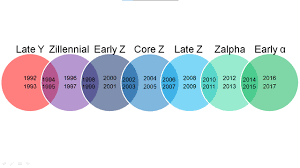Understanding Gen Z: Characteristics and Trends

Introduction
Generation Z, commonly referred to as Gen Z, encompasses individuals born from the late 1990s to the early 2010s. This generation, currently aged between 11 to 26, is becoming increasingly influential in shaping societal values, consumer behaviour, and technological advancements. Understanding Gen Z is crucial as businesses and policymakers strive to navigate the rapidly evolving landscape influenced by their distinct preferences and perspectives.
Characteristics of Gen Z
Gen Z is often characterised by their digital nativity. Unlike previous generations, they have grown up with smartphones and social media as integral parts of their lives. A report by Pew Research Center states that over 95% of Gen Z own a smartphone, significantly influencing their communication habits and social interactions. This digital fluency translates into a preference for online shopping, with 67% stating they prefer to purchase products through social media.
Moreover, Gen Z is notable for their commitment to social justice and environmental sustainability. A survey conducted by Ipsos indicated that 76% of Gen Z members feel a responsibility to take action on social issues, ranging from climate change to racial equality. This sense of activism is reflected in their support for brands that align with their values, prompting companies to adopt more ethical and transparent practices.
Trends Shaping Gen Z
As this generation continues to mature, several trends are emerging that will shape their future. For one, remote work and flexible employment arrangements have become increasingly preferred, as highlighted by a Gallup study showing that 86% of Gen Z workers value job flexibility highly. This desire has implications for employers aiming to attract and retain talent.
Additionally, mental health awareness is a defining issue for Gen Z. According to the National Alliance on Mental Illness, 90% of Gen Z respondents reported feeling overwhelmed by the complexities of modern living, prompting a greater push for mental health resources and support systems in educational and workplace environments.
Conclusion
In conclusion, Generation Z represents a transformative force in various facets of society. Their unique characteristics and values drive changes in consumer behaviour, workplace expectations, and societal norms. As this generation continues to come of age, it is crucial for businesses, educators, and policymakers to understand and adapt to their perspectives. This insight will not only foster better engagement with Gen Z but also facilitate a more inclusive and forward-thinking future.









